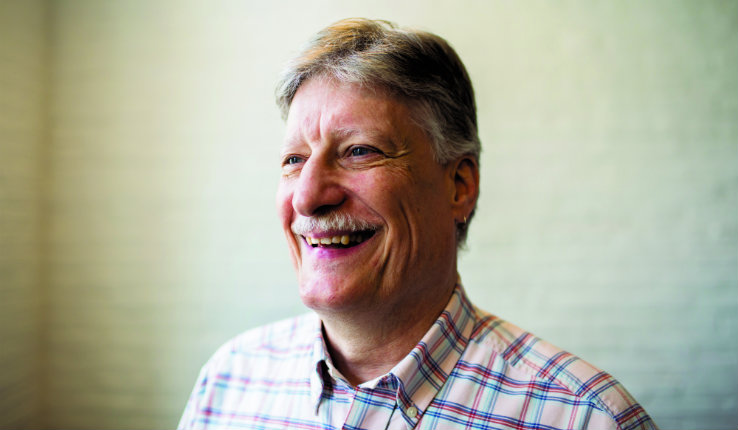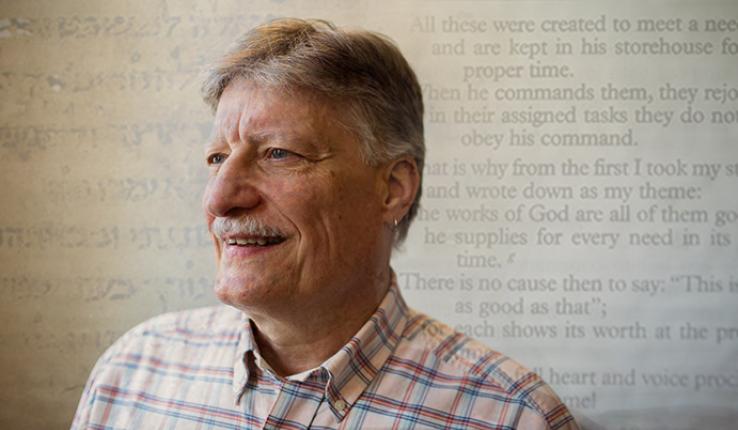Three days before Ben Wright’s 65th birthday, he opened his email and saw a message from Eva Mroczek, associate professor of religious studies at the University of California, Davis and an early-career colleague.
Mroczek’s email contained birthday wishes that included a link that directed Wright to a webpage on Ancient Jew Review, which deals with the very issues Wright studies: ancient Judaism. The specific page on the site Wright was emailed was titled A Genius for Mentorship: A Forum in Honor of Ben Wright on his 65th Birthday.
Mroczek and Francis Borchardt, associate professor at the Lutheran Theological Seminary Hong Kong, put together “a collection of essays as a tribute” to Wright, or what Wright says they called a “non-Festschrift, Festschrift.” A Festschrift is German for a celebratory writing that is typically composed when the recipient turns 65—the age many in the United States and Europe previously targeted for retirement.
Little did Wright know, the acknowledgement of his career achievements did not end with the website.
Two months later, Wright, university distinguished professor of religion studies at Lehigh, was invited to a conference at UC Davis, which concluded with a session in Wright’s honor, celebrating his birthday. A few months after Wright returned home from the conference, he received the final surprise: a Festschrift written in his honor, Figures who Shape Scriptures, Scriptures that Shape Figures: Essays in Honour of Benjamin G. Wright III, published by the German academic publisher Walter de Gruyter.
“This is a really big deal,” Hartley Lachter, associate professor and chair of religion studies at Lehigh, says. “Most people would never get a Festschrift, but he's had such a huge impact in his field. I don't think people recognize how really famous Ben Wright is.”
Lachter says scholars at important European universities, such as Cambridge and Oxford, equate Lehigh with Ben Wright.
“He's just such an important scholar for a lot of new approaches to second temple Judaism, which means new approaches to thinking about the history of Western religion,” Lachter says.
Géza Xeravits, a co-editor of the Festschrift and professor at Selye J. University in Hungary, pitched the idea of saluting Wright as his milestone birthday grew closer to Greg Schmidt Goering, the other co-editor and associate professor of religious studies at the University of Virginia.
“It was the kind of proposal I could not turn down, since Ben had been such an important mentor, colleague and friend to me and to so many other younger scholars,” Goering says. “Géza and I approached a number of Ben’s peers and junior colleagues, inviting them to contribute essays, written in his honor, on topics related to Ben’s scholarship.”
The Festschrift features 14 contributors who wrote essays that engaged some of Wright’s work. To Wright, the honor was a surprise, but scholars in the field made it clear how much of an impact Wright has made and how deserving he is of the recognition.
“As a leading intellectual in his generation on the history and religion of Judaism and Christianity through the first century CE (i.e., the Common Era = AD), Ben has not only been one of the most prolific and influential scholars on a range of subjects in this field, he has also served as an extraordinary mentor to many of us,” Goering says. “This latter role speaks to Ben’s selflessness and generosity. While he could always have used his time to write one more article or another book, he gave liberally of his time and wisdom to others.”
One example—Goering says he can give many—came early in Goering’s career. Goering was invited to write a commentary on an ancient text that Wright happened to be an expert on. Goering says the project seemed overwhelming due to the length of the text and complexity of the manuscripts. He was unsure he wanted to accept.
Before making a decision, he sought Wright’s advice. Goering estimates the two spent over an hour on the phone weighing the pros and cons before Wright suggested finding a co-author to make things more manageable.
“In the end, that’s what I did, and now I am working happily on this multi-year project with a colleague,” Goering says.
Lachter says Festschriften are a surprise and typically written by one’s colleagues and students. Since Lehigh doesn’t have a graduate program in religion studies, Wright doesn’t have Ph.D. students who need to work closely with him in order to finish their studies—the type of students who normally would contribute to a Festschrift. Lachter says that makes Wright’s Festschrift even more remarkable.
“It's not that Ben has students who did their Ph.D. with him and owe everything to him, who are doing this for him,” Lachter says. “These are people who he has worked with in different capacities. Maybe he was on their dissertation committee where he's worked with them not because they were his students, but because Ben is an incredible, generous guy who is out there mentoring people just because that's what he does.”
Wright downplays the praise he has received for mentoring, saying he does it because others have always done that for him. There were scholars throughout his career who mentored him even though they weren’t all his teachers, he says, as he lists countless names of those who have provided guidance.
One he mentions specifically is Robert Kraft, his Ph.D. supervisor at the University of Pennsylvania. Thanks to Kraft, as a second-year graduate student, Wright attended a Harvard reception at a conference and was introduced to George Nickelsburg, a well-known scholar in the field. The two ended up becoming friends for the next 25 years.
While the Lehigh Department of Religion Studies doesn’t have a graduate program, Wright says when he has the opportunity he always tries to sit with graduate students and early-career scholars who want to talk.
“If I can do that, I have to opportunity to do that for someone else, why wouldn’t I?” Wright asks. “That’s what was done for me.”
In addition to mentoring, Lachter says Wright is always doing something new.
“His mind is always going to fresh questions and asking the sorts of new things that push the field forward, and I think that's why people really value him,” Lachter says. “He makes the kind of contributions that then make other people’s work more fruitful, too.”
Wright notes he’s not done with his work just yet, but expressed how fortunate he has been not only for the opportunity to have this career, but also for the people he has encountered over the years.
“I’m grateful that at least up to this point there have been people who have looked at what I’ve done and thought it worth this kind of attention,” Wright says. “I still sometimes don’t have the words to talk about it because it was just so surprising and so incredibly flattering. I’m grateful to all my colleagues who have thought that I was worth this kind of time and expenditure of energy and work. I’m just really grateful for that. And hopefully, as I continue my career, I continue to live up to the expectations.”





